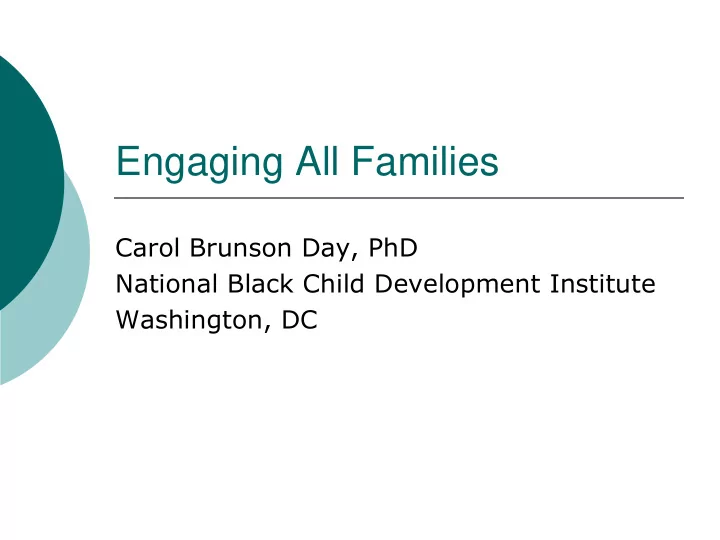

Engaging All Families Carol Brunson Day, PhD National Black Child Development Institute Washington, DC
Why engage parents in early education? Research demonstrates that: Parenting matters Family involvement matters Children benefit academically when parents and educators work together (US Department of Education, PIRC report)
Tenets of Early Childhood Education Educating the whole child Cognitive, social/emotional and physical Health Supporting the family Social services Parents as children’s first teachers
Changing Conceptualizations of Parents in Early Childhood Education Involvement Education Engagement
Family Involvement Matters For children of all ethnic and cultural backgrounds The most at-risk children and families benefit most
Changing Demographics Percentage of U.S. children ages 0 – 17 by race and Hispanic origin, 1980 – 2004 and projected 2005 – 2020 (U.S. Census Bureau, www.childstats.gov)
Emergent Majority Children More likely to be poor Fewer likely to have stable medical care More likely to be behind in school Plagued by systemic failure to thrive
Assumptions Matter In Approach Parents want what’s best for their children. Parents know best what they need to be better parents. Parents learn best when they are involved in selecting the topics and activities they want to focus on. Given the proper information and resources, parents will make the best choices for their children.
Parent Empowerment Project - PEP Active, parent-driven curriculum designed primarily for and by lower-income African- American parents Components that build on cultural strengths Successful Parenting African American Culture Latino American Culture My Vision for the Future
Implementing PEP Demonstration Project Parent Education Personal Development Career Counseling Develope Curriculum Successful Parenting African American Culture My Vision for the Future Pilot Project Site 1 Site 2 Site 3 Site 4 Site 5 Site 6 Site 7 Site 8 Site 9 Site 10
PEP Pilot Project Sites Audrey L. Smith CDC Gray’s CDC, San Francisco, CA Milwaukee, WI Hartford Elementary, Florida First Baltimore, MD Start,Cocoa, FL Bedford Hills Cameo House, San Correctional Facility, Francisco, CA Bedford Hills, NY Tenderloin CDC, San Pine Bluff Public Francisco, CA Schools, Pine Bluff, AK YMCA Garfield, Penn Center, USC, Chicago, IL Beaufort, SC
Principles of PEP Focusing on building trusting collaborative relationships among teachers, families, and community members; Recognizing, respecting, and addressing families’ needs and any class and cultural differences; Embracing a philosophy of partnership where power and responsibility are shared
Outcomes of PEP A respectful relationship within the parent group that is based on trust and caring. Changes in parenting behaviors that lead to appropriate cognitive development of children. A conscious awareness of parents’ role as their child’s first teacher. Positive behavior change in the way parents function with their children and within their families.
Promising Practices Many models have demonstrated strategies for successfully engaging culturally diverse parents Harlem Children’s Zone Parent Involvement Resource Centers Incredible Years Parenting Program
How do we know when programs are effective with diverse populations? Community based programs have experienced a wide range of evaluation Need a “pipeline” to become fully evaluated Important to build upon community based programs with strong relationships with culturally specific communities
Challenges Moving Forward Systemic embrace of parent engagement Accountability for engaging diverse families Evaluation challenges for community- based programs
Essential Recommendations Support development and refinement of culturally specific and culturally sensitive parent engagement strategies Build an evaluation pipeline
Recommend
More recommend